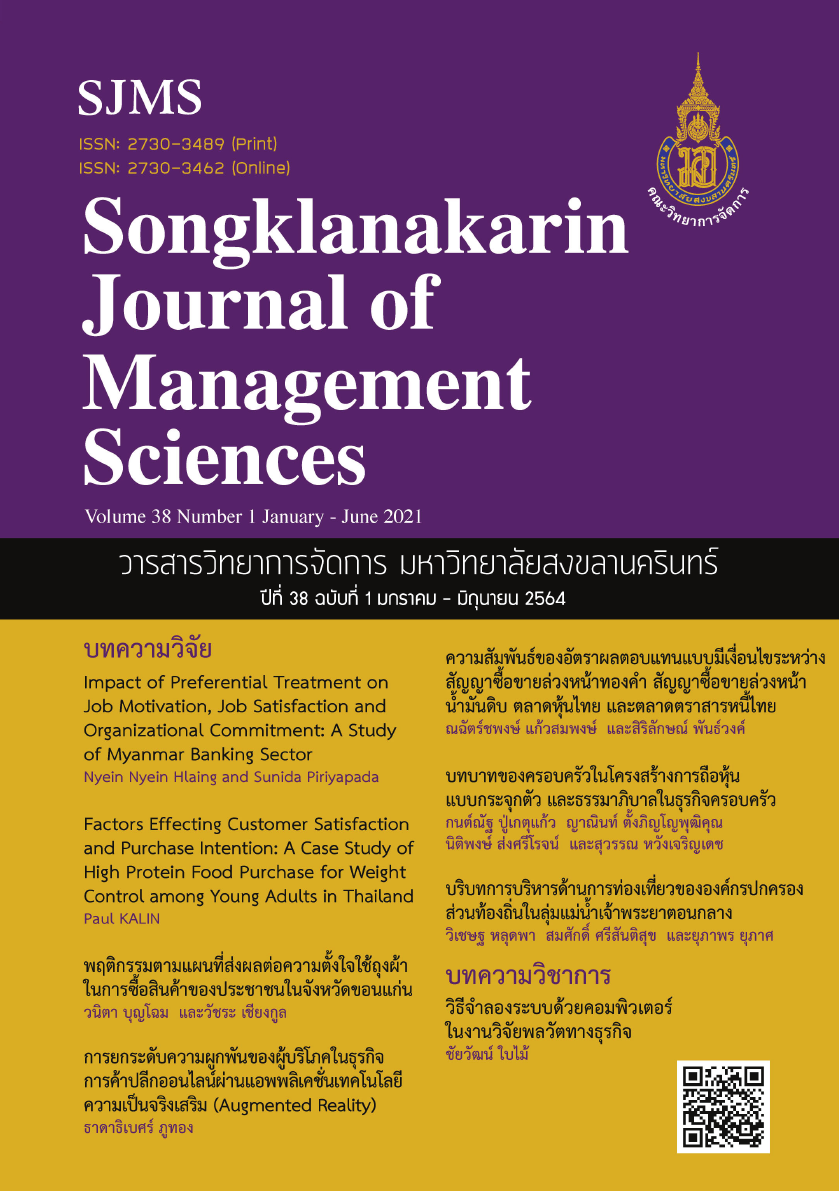Impact of Preferential Treatment on Job Motivation, Job Satisfaction and Organizational Commitment: A Study of Myanmar Banking Sector
Main Article Content
Abstract
This study aims to investigate the impact of preferential treatment: favoritism, nepotism and cronyism, on job motivation, job satisfaction and organizational commitment in the private banking sector, Myanmar. The convenient sampling method was used in the data collection. The self-administered questionnaires were distributed to the employees working at the domestic private banks through both online and offline methods. In total, 383 questionnaires could be used for data analysis by using regression analysis. From the obtained results, favoritism and nepotism are positively significant on job motivation and job satisfaction, whereas nepotism shows a negative significance on organizational commitment. In conclusion, the research results were highlighted both theoretical and managerial implications from the impact of favoritism, nepotism and cronyism on job motivation, job satisfaction and organizational commitment. Thus, managing human resource management activities based on principle of merits rather than preferential treatments, can support the better performance of Myanmar private banks with the qualified and well-trained staffs, for long-term survival as Qualified ASEAN Banks (QABs).
Article Details

This work is licensed under a Creative Commons Attribution-NonCommercial-NoDerivatives 4.0 International License.
All published articles are SJMS’s copyright. The editorial board allows all published articles to be copied, excerpted, or disseminated with academic citation.
References
Abdalla, H. F., Maghrabi, A. S., & Raggad, B. G. (1998). Assessing the perceptions of human resource managers: A cross-cultural study. International Journal of Manpower, 19(8), 554-470. Retrieved December 20, 2019, from http://dx.doi.org/ 10.1108/01437729810242235
Allen, N. J. (1990). The measurement and antecedents of affective, continuance and normative commitment to the organization. Journal of Occupational Psychology, 63(1), 1-18.
Arasli , H., & Tumer, M. (2008). Nepotism, Favoritism and Cronyism: A study of their Effects on Job Stress and Job Satisfaction in the Banking Indsutry of North Cyprus. Social Behavior and Personality, 36(9), 1237-1250.
Arasli, H., Bavik, A., & Ekiz, E. H. (2006). The effects of nepotism on human resource management. International Journal of Sociology and Social Policy, 26(7), 295-308. doi:10.1108/01443330610680399
Armstrong, M. (2006). A Handbook of Human Resource Management Practice (10th ed.). London: Kogan Page Limited.
Berger, R. (2016). Myanmar Banking Sector 2025:The Way Forward. Munich, Germany: Roland Berger Strategy Consulting Firm.
Boles, J., Madupalli , R., Rutherford, B., & Wood, J. A. (2007). The Relationship of Facets of Salesperosn Job Satisfaction with Affective Organizational Commitment. Journal of Business & Industrial Marketing, 22(5), 311–321. doi:10.1108/08858620710773440
Bute, M. (2011, March). The Effect of Nepotism and Favoritism on Employee Behaviors and Human Resources Practices: A Research on Turkish Public Banks. TODAĐE’s Review of Public Administration, 5(1), 185-208. Retrieved December 13, 2019, from https://www.researchgate.net/publication/299018831
Colquitt, J. A., Lepine, J. A., & Wesson, M. J. (2017). Organizational Behavior: Improving Performance and Commitment in the Workplace (5th ed.). New York: McGraw-Hill Education.
Dagli, A., & Akyol, Z. (2019). The Relationship between Favoritism Behaviours of Secondary School Administrators and Organizational Commitment of the Teachers. Journal of Education and Training Studies, 35-49. Retrieved December 5, 2019, from http://jets.redfame.com
Gheitani, A., Imani, S., Seyyedamiri, N., & Foroudi, P. (2018). Mediationg Effect of Intrinsic Motivation on the Relationship Between Islamic Work Ethic, Job Satisfaction, and Organizational Commitment in Banking Sector. International Journal of Islamic and Middle Eastern Finance and Management. Retrieved December 12, 2019, from https://doi.org/10.1108/IMEFM-01-2018-0029
Gruneberg, M. M. (1979). Understanding Job Satisfaction. London and Basingstoke: The Macmillan Press Ltd. doi:10.1007/978-1-349-03952-4
Guest, D., Conway, N., Briner, R., & Dickman, M. (1996). The State of Psychological Contract in Employment:Issues in People Management. London: Institute of Personnel and Development.
Hair, J. F., Black, W. C., Babin, B. J., & Anderson, R. E. (2010). Multivariate Data Analysis (7th ed.). Pearson Prentice Hall.
Hayati, K., & Caniago, I. (2012). Islamic Work Ethic: The Role of Intrinsic Motivation, Job Satisfaction, Organizational Commitment and Job Performance. Procedia - Social and Behavioral Sciences, 65, 272 – 277. doi:10.1016/j.sbspro.2012.11.122
Hofmann, A. (2018). Myanmar’s Banking Sector in Transition. Banking and Financial Sector Development in Myanmar. Yangon: Internationale Zusammenarbeit (GIZ) GmbH.
Hofstede, G., Hofstede, G. J., & Minkov, M. (2010). Cultures and Organizations. New York: McIGraw-Hill.
Iqbal, Q. (2016, September). Preferential Treatment: An Empirical Study in Education Sector of Pakistan. International Journal of Management, Accounting and Economics, 3(9), 486-497. Retrieved December 3, 2019, from https://www.research gate.net/publication/330102339
Khatri, N., & Tsang, E. W. (2003). Antecedents and Consequences of Cronyism. Journal of Business Ethics, 289–303. doi:10.1023a 1023081629529 023081629529
Mowday, R. T., Steers, R. M., & Porter, L. W. (1979). The Measurement of Organizational Commitment. Journal of Vocational Behavor, 14(2), 224-247.
Nadeem, M., Ahmadb, R., Ahmadc, N., Batool, S. R., & Shafique, N. (2015). Favoritism, nepotism and cronyism as predictors of job satisfaction: Evidences from Pakistan. Journal of Business and Management Research, 8, 224-228.
Pelit, E., Dinçer, F. I., & Kılıç, İ. (2015). The Effect of Nepotism on Organizational Silence,Alienation and Commitment: A Study on Hotel Employees in Turkey. Journal of Management Research, 7(4), 81-110. Retrieved December 10, 2019, from http://dx.doi.org/10.5296/jmr.v7i4.7806
Raja, Y. M., Zaman, H. M., Hashmi, Z. I., Marri, M. Y., & Khan, A. R. (2013). Impact of organizational politics & favoritism on employees job satisfaction. Elixir International Journal, 64, 19328-19332.
Sadozai, A. M. (2012, October). Impact of Favoritism, Nepotism and Cronyism on Job Satisfaction: A Study from Public Sector of Pakistan. Interdiciplinary Journal of Comtempory Research in Business, 4(6), 760-771.
Warr, P., Cook, J., & Wall, T. (1979). Scales for the measurement of some work attitudes and aspects of psychological well-being. Journal of Occupational Psychology, 52(2), 129-148.

